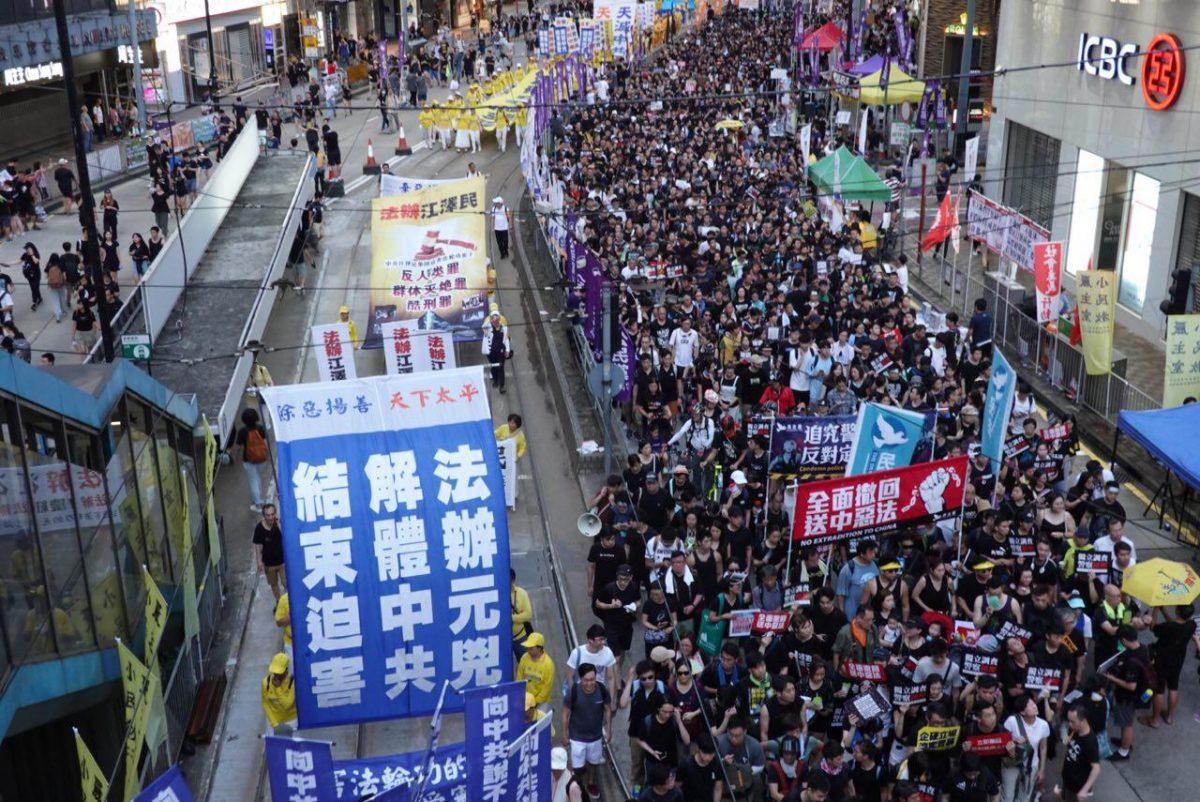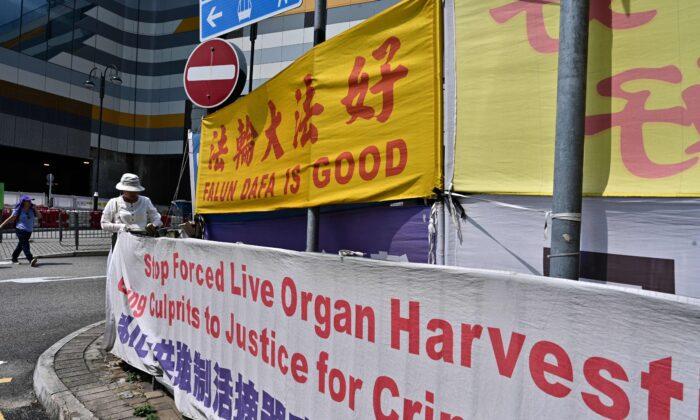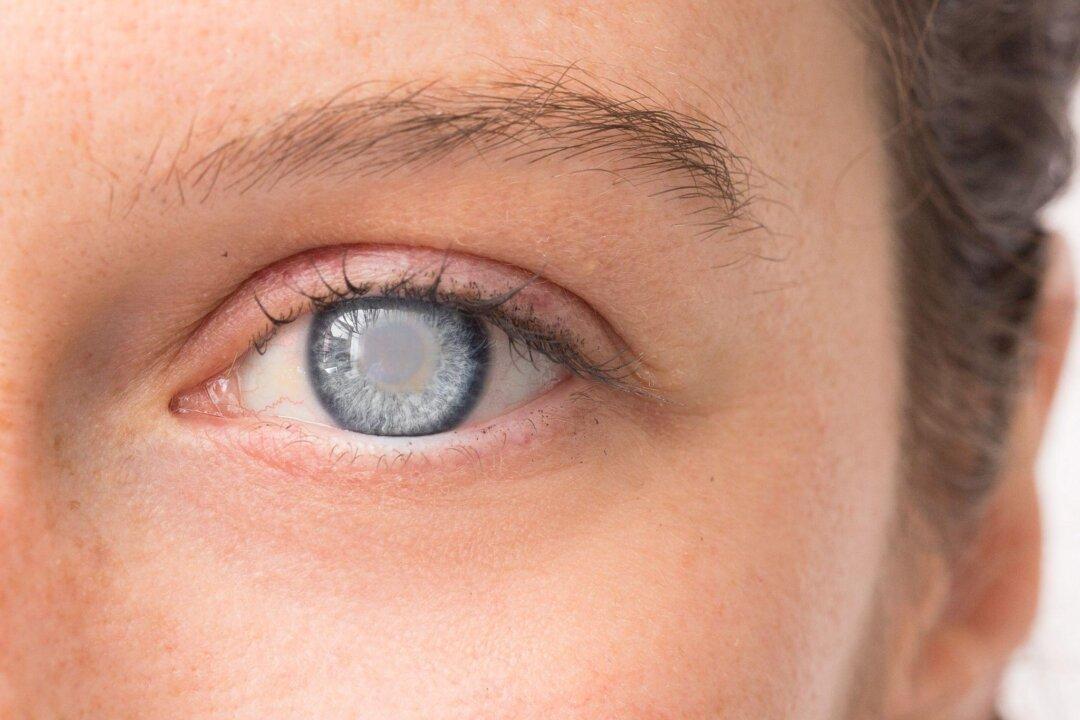Falun Gong adherents in Hong Kong have been protesting peacefully against the Chinese regime’s persecution of the meditative practice by displaying banners and boards on the streets for many years.
However, in May last year, the Hong Kong Court of Final Appeal ruled that practitioners’ exhibits must be approved by the local government in accordance with the “Public Health and Municipal Ordinance.”
A few days later, authorities forcibly removed the exhibits and issued fines to several practitioners for “displaying posters without permission.”
Ms. Dong, who was among those receiving a fine, denied the charges and defended herself. On June 22, the court declared her not guilty.
Dong was alleged to have displayed a vertical banner and a placard on a trolley at the Tung Chung bus terminal on May 28, 2021. The banner read: “Falun Dafa is great. Truthfulness-Compassion-Forbearance is great.” An hour after she set up, the Food and Environmental Hygiene Department (FEHD) confiscated her trolley, banner, placard, and other items, and took her to the FEHD office for investigation.
‘Some Degree of Permanence and Habitual Regularity’
Magistrate Jason Wan Siu-ming said when announcing the ruling that the defendant testified that the last time publicity materials were displayed at the bus terminal was in 2018, which was several years before the present case. According to the interpretation by the Court of Final Appeal of Section 104A of the Public Health and Municipal Services Ordinance “prohibiting the display of posters without permission,” if the display does not reach “some degree of permanence and habitual regularity,” the act of display does not constitute a crime.Considering the statements from the prosecutor and defendant, it was difficult to prove that the defendant’s exhibits were “regular,” therefore, the defendant was ruled not guilty.
The prosecutor demanded that Dong’s trolley, banner, and placard be confiscated, but the magistrate ruled that the FEHD must return the items. However, the prosecutor’s legal representative told Dong after leaving the court that she would not be able to return her belongings until a month later, because she had to report to the Department of Justice first to confirm that the department would not appeal.

Dong did not call for witnesses but chose to testify in court. When asked by the magistrate why she went to the bus terminal, Dong said that she had been practicing Falun Gong since 1997. Ever since then-Chinese Communist Party leader Jiang Zemin began to persecute Falun Gong in 1999, the persecution hasn’t stopped and there is even the crime of live organ harvesting from Falun Gong practitioners. Dong said her parents were arrested for practicing Falun Gong and died as a result of the persecution. She wanted to seek justice, hoping that the public will help stop the persecution.
Dong also said that Falun Gong is a meditation practice with healing and fitness effects. With the COVID-19 pandemic wreaking havoc, she wanted to tell the public about the benefits of Falun Gong, so that people can enjoy a safe and healthy life.
Asked for Permission
She explained that a few years ago, she asked FEHD staff how to apply for permission, and the staff said to apply to the Lands Department. When she called the Lands Department, the person who answered the phone replied that only Hong Kong councilors can apply for exhibit permits.Central to the case was whether Section 104A of the Public Health and Municipal Services Ordinance is limited to exhibits with “some degree of permanence and habitual regularity,” and that the Hong Kong Court of Final Appeal did not define “some degree of permanence and habitual regularity.”
The prosecutor believed that, except for exhibits displayed during parades and assemblies for which organizers asked for permission, all other exhibits are regulated by Section 104A.
Dong, on the other hand, said in her closing statement that her banners and placards were placed on a trolley and could be moved away at any time. They were not permanent, habitual, or regular in nature, so there was no need to apply for a permit from the government.

She also emphasized that the law must not deviate from common sense and human nature. In her case, she displayed a small banner at the bus stop without bothering anyone. She questioned the FEHD: “Why are you spending so much human and financial resources to hunt me down? … The murders [in mainland China] killed my brothers and sisters. Why is it some people believe that I should keep silent and do nothing to redress the injustice?”





Friends Read Free